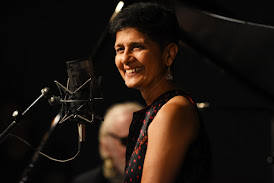Dr. Anthony Branker is quite an accomplished person with a list of achievements that would fill this page. I spoke to him in 2017 at the time Origin Records released "Beauty Within", his seventh album of original compositions (and six issued by the Seattle, WA-based label). At that time, he had recently stepped down as the head (and founder) of the Jazz Studies Program at Princeton––he currently is Adjunct Professor at the Mason Gross School of Music at Rutgers University. I am impressed by his ability to tell stories, truths about issues such as racism, equality, spirituality, and more, writing music that sounds familiar yet can be challenging, swings yet sings. The son of Caribbean immigrants, Dr. Branker once played his music (he was a trumpet player) in venues around the world. Dr. Branker has also conducted ensembles for Terence Blanchard and Wynton Marsalis as well as orchestras in Israel, Germany, Japan, Estonia, and in the United States.
His eighth album, "What Place Can Be For Us: A Suite In 10 Movements" (Origin), is the second recording with his Imagine ensemble, an octet built around guitarist Pete McCann, pianist Fabian Almazan, and bassist Linda May Han Oh plus Walter Smith III (tenor saxophone), Remy Le Boeuf (alto and soprano saxophones), Philip Dizack (trumpet, flugelhorn), Donald Edwards (drums), and on two tracks, Alison Crockett (vocal and spoken word). As you should be able to tell by the title, the themes of this new collection are inclusion, immigration, belonging, citizenship, and the never-ending racism that permeates the United States. Ms. Crockett is featured on the opening track, "The Door of No Return", an episodic that blends the squalling guitar of Pete McCann, the telegraph notes from the piano, and the words of poet Beatriz Esmer. There is a powerful solo from Smith III as well as well as brilliant background arrangements. The words hearken back to The Middle Passage (many more Black Africans were enslaved in Brazil than anywhere else on the American continent).
Elsewhere, there's the nervous energy of McCann's guitar solo and the wistful alto sax solo from Le Boeuf on "Indivisible", the melancholy reminiscence of "Sundown Town" with far-ranging solos from Almazan and Dizack, and the "prog-rock meets hard bop" riff on "Sanctuary City" and the crackling guitar of McCann and keening tenor sax.
As you should be able to tell, Dr. Anthony Branker does not shy away from controversy; instead he channels his concerns, beliefs, and his fears into music that often vibrates with urgency, compassion, commitment, and impressive musicianship. Don't you shy away from "What Place Can Be For Us: A Suite In 10 Movements"––instead, embrace its activism, its message, and its power.
For more information, go to www.anthonybranker.com/. To hear more and to purchase the album, go to
Vocalist and educator Christine Correa came to the United States from her native Bombay, India, in 1979––she came to attend the New England Conservatory of Music in Boston, MA, which is where she met two people who became very important in her life, pianist Ran Blake and pianist Frank Carlberg who is a frequent collaborator as well as her husband. Ms. Correa is currently on the faculties of Columbia University’s Louis Armstrong Jazz Performance Program, Teacher’s College at Columbia University and the New School as well as the Director of the Maine Jazz Camp. She's recorded five duo albums with Ran Blake, 10 albums (in groups of various sizes) with Mr. Carlberg, and, at least, a half-dozen with other artists but never an album under own name.
There's so much to take on this brilliant album. Ms. Correa's duet with drummer Sarin in the first 90 seconds of "All Africa" is a stunning introduction to the body of the song in which the vocals name various tribes of the African Continent. The soprano sax solo over the drums is powerful, very moving and expressive. The wordless vocals on "Tears for Johannesburg" speaks to the treatment of the oppressed black citizens under South Africa's apartheid regimes. The ensemble moves in and out of time throughout plus there are excellent solos from Newsome and bassist Cass.
The album closes with Brown, Jr./Roach's "Freedom Day", a piece that is, at times, frolicsome, free, impulsive, pulsing with urgency, and in the end, questioning if we are really "free" (certainly the Black population of the United States has rarely been truly free to be).
From start to finish, "Just You Stand and Listen With Me" is quite powerful. Christine Correa not only celebrates the amazing and controversial music of Max Roach, Abbey Lincoln, and Oscar Brown, Jr. but also asks questions about whether her adopted country–the United States–can ever truly be the place where "All Men (and Women) Are Created Equal".
For more information, go to https://christinecorrea.com/. To hear more and to purchase the album, go to https://sunnysiderecords.bandcamp.com/album/just-you-stand-and-listen-with-me-2.
Hear Ms. Correa singing Abbey Lincoln's words on "Mendacity":








No comments:
Post a Comment